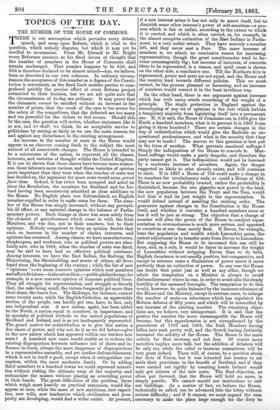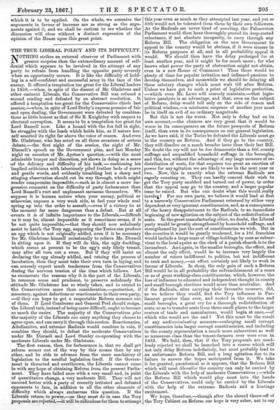TOPICS OF THE DAY.
THE NUMBER OF THE HOUSE OF COMMONS. THERE is one assumption which pervades every debate, speech, and essay upon Reform, which is vital to the question, which nobody disputes, but which it may yet be needful to re-examine. From Mr. Disraeli to Mr. Bright every Reformer assumes as his fixed datum of thought that the number of members in the House of Commons shall remain unchanged. That number happens to be 658, and 658 is therefore declared to be almost sacred—has, we believe, been so described in our own columns. In ordinary circum- stances the acceptance of this number as a dogma of the Consti- tution is convenient, as the fixed limit enables parties to com- prehend quickly the precise effect of every Reform project submitted to their decision, but we are not quite sure that the circumstances of to-day are ordinary. It may prove that the claimants cannot be satisfied without an increase in the number of prizes, that the crush of the race is too severe for the safety of the competitors, that the defeated are too many and too powerful for the victors to feel secure. Should this be the case, the question will revive, whether statesmen like it or not, and w..? shall, we think, do an acceptable service to politicians by stating as fairly as we can the main reasons for and against any disturbance in the existing arrangement.
An increase in the number of seats in the House would appear to an observer coming fresh to the subject the most natural of all conceivable changes. The House is intended to be a microcosm of the nation, to represent all the classes, interests, and varieties of thought within the United Kingdom. If it can be shown that those classes have become more numer- ous, those interests more various, and those varieties of opinion more important than they were when the number of seats was last decided on, the argument for more seats would seem primd facie clear. Indeed, it has twice been accepted and acted on since the Revolution, the members for Scotland and for Ire- land having been successively admitted as clear additions to the House. No English place was disfranchised, no English member expelled in order to make room for them. The num- ber of the House was simply increased, without any percepti- ble ill effect, or any material change in the balance of Parlia- mentary powers. Such change as there was arose solely from the element of querulousness which came in with the Irish Members, and was due, not to their numbers, but to their opinions. Nobody competent to form an opinion doubts that such an increase in the number of classes, interests, and opinions has occurred. Among classes, we have manufacturers, shopkeepers, and workmen, who as political powers are abso- lutely new, who in 1801, when the number of seats was fixed, may be said to have had no effective political existence. Among interests, we have the East Indian, the Railway, the Shipowning, the Shareholding, and scores of others, all deve- loped since the beginning of the century ; while the list of new "opinions "—we mean concrete opinions which seat members and affect divisions—is almost endless ; —public philanthropy, for example, is a new concrete opinion of immense political force. They all struggle for representation, and struggle so fiercely that, the cake being small, the victors frequently get more than their share, the losers less. The Railways, for instance, control some twenty seats, while the English Catholics, an appreciable section of the people, can hardly get one, have, in fact, only one independent seat. A new nation, again, has been added to the North, a nation equal in numbers, in importance, and in specialty of political attitude to the united populations of Scotland and Ireland, and is as yet inadequately represented. The grand motive for redistribution is to give this nation a due share of power, and why not do it as we did before—give to the new nation which has appeared within our borders new seats ? A hundred new seats would enable us to redress the existing disproportion between influence out of doors and in- fluence in-doors, always the most dangerous of disproportions in a representative assembly, and yet confine disfranchisement, which is not in itself a good, except when it extinguishes cor- ruption, within the most moderate limits. Or by adding third members to a hundred towns we could represent minori- ties without risking the ultimate sway of the majority, and enfranchise the masses without placing an overriding power in their hands. The great difficulties of the problem, those which weigh most heavily on practical statesmen, would dis- appear at once, while the mass of new ambitions, new capaci- ties, new wills, new tendencies which civilization and pros- perity are developing, would find a wider outlet. At present, if a new interest arises it has not only to assert itself, but to diminish some other interest's power of self-assertion—a pro- cess which is fair or unfair, according to the extent to which it is carried, and which is often carried, as, for example, in_ the almost complete extinotion of the East Indians in Parlia- ment, to a very unfair extent. They have scarcely a member left, and they never seat a Peer. The mere increase of numbers is, we admit, no conclusive reason for increasing representatives, though the great constituencies tend to be- come unmanageably big ; but increase of interests, of concrete; ideas to be represented, is a reason, and until cause is shown on the other side, a conclusive one. Till the Northern hive is represented, power and seats are not equal, and the House and the country tend towards different policies. This we must correct, be the process pleasant or harassing, and an increase of numbers would correct it in the least invidious way.
On the other hand, there is one argument against increase which has with many minds something of the weight of a. principle. The single protection in England against the- stereotyping of any set of opinions is the rule which forbids. a temporary majority from legislating itself into a permanent one. If, it is said, the House of Commons can in 1866 give the North a hundred members, what is to prevent it in 1867 from, giving it three hundred ? There are certain changes in the- way of redistribution which would give the Radicals an un- questioned predominance, and what is the security that they may not be made ? The answer to this question is best put. in the form of another. What prevents manhood suffrage I- Simply the indisposition of the House to concede it. Man-- hood suffrage would make a party despotic, and therefore the party cannot get it. The indisposition would not be lessenel by a moderate increase of members. Again, the danger suggested as likely to arise already, exists, and will continue to exist. If in 1867 a House of 758 could make a change in. its numbers for revolutionary ends, so could a House of 658.. There is no new probability created, rather the probability is. diminished, because the one gigantic new power in the land, the new population between the Trent and the Tees, would_ feel that it had its just weight in the representation. It would defend instead of assailing the existing order. The guarantee against changes in the Constitution is the House itself, and whether it contains a hundred members more or less it will be just as strong. The objection that a change of number will alter the power of the House to readjust repre- sentation to circumstances is much more serious, and appeared. to ourselves at one time nearly final. If Devon, for example,. loses the population and wealth which Lancashire gains, the easiest adjustment is to transfer seats from Devon to Lancashire. But supposing the House to be increased this can still be done, and, as a rule, it would be fairer to increase the weight of Lancashire without stripping Devon than to do both. English decadence is not usually positive, but comparative, and' except in extreme cases a diminution of power meets it more perfectly than an extinction of power. In any case the House can decide that point just as well as any other, though we admit the temptation on a Minister is always to avoid disfranchisement where he can, in order to avoid also the steady hostility of the menaced boroughs. The temptation to do this. would, however, be quite balanced by the immense relutance of the House and the Ministry, except in extreme cases, to enlarge the number of seats—a reluctance which has regulated the Reform debates of fifty years, and which will be intensified by any increase or the existing number. The remaining objec- tions are, we believe, very unimportant. It is said that the greater the number the more unmanageable the House will become, but this apprehension is not strengthened by the precedents of 1707 and 1801, the Irish Members having- fallen into rank pretty well, and the Scotch having distinctly increased the solidity of the House. The House is the more orderly for that increase, and not less. Of course more members implies more talk, but the addition of debaters will be only ten, while the relief to business committees will be very great indeed. There will, of course, be a question about the Acts of Union, but it was intended last session to set aside their provisions to the benefit of Scotland, and if they- were carried out rigidly by counting heads Ireland woulcl only get sixteen of the new seats. The final objection, so. often put forward, that the House will hold no more, is simply puerile. We cannot mould our institutions to suit our buildings. As a matter of fact, we believe the House, technically so called, can be advanced into the lobby without. serious difficulty ; and if it cannot, we must expend the sum necessary to make the place large enough for the duty to
which it is to be applied. On the whole, we conceive the arguments in favour of increase are as strong as the argu- ments against it, and we shall be curious to see whether the discussion will close without a distinct expression of the opinion of the House upon this great point.































 Previous page
Previous page